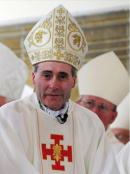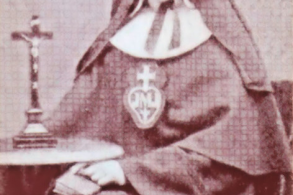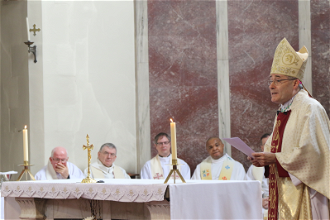Bishop of Shrewsbury: loyalty to the Pope is not based on personal 'likes' or 'dislikes'

Bishop Mark Davies
Catholics should be wary of the interpretation of the personal style of Pope Francis that is being presented by some commentators in the media, the Bishop of Shrewsbury will say today. In a homily at a Mass for the Union of Catholic Mothers, the Rt Rev Mark Davies will note that the Holy Father has become “the focus of fascination” in the media, partly because of his “evident goodness”, “informal style” and “Christian simplicity”.
But this has led to a construction of a public personality by some commentators who do not truly understand the Petrine ministry and are seeking to further their own agenda rather than arrive at an authentic understanding of what the Pope truly represents, the Bishop will say. The Bishop will remind the congregation gathered for the National Council meeting of the UCM in Swanwick, Derbyshire, that the loyalty and love that Catholics share for the Pope flows principally from his office as Successor of St Peter and his responsibility as the chief shepherd of Christ’s universal Church.
It is only from the supernatural perspective of faith that the ministry of Pope Francis can be properly understood, he will say. The Bishop will say that the simplicity we see in Pope Francis “leads us, not towards abandoning the demands of the Catholic faith, as some commentators might hope or suppose, but directly to those demands in their most radical, beautiful and uncompromising essence”.
Bishop Davies will say: “I can’t remember how many times I have been asked everywhere from radio stations to petrol stations whether I liked the new Pope? To the Catholic mind this is a strange question as the loyalty we owe to the Pope is not based upon personal ‘likes’ or ‘dislikes’. My invariable reply is that ‘We love the Pope whoever he is’. This may seem just as puzzling to my questioners.
“Those long experienced in the media warn of something we may already see taking shape and will require of us the very supernatural perspective Pope Francis urges. They tell of how a public personality can be built up in the media. In this case, it is based on the Pope’s evident goodness and an informal style which is then contrasted even with his most saintly predecessors.
Expectations are subtly or less subtly raised that this is the man who will change the Catholic faith itself in accordance with the commentator’s own wishes and agenda.
However, when the Pope fails to conform to these false expectations a souring begins to take place. I noticed only last week a concern being expressed in our national media that our Holy Father is proving as ‘hard-line’ as his predecessors. ‘Likes’ may quickly turn to ‘dislikes’ in the public forum. “We know, as Catholics, that the loyalty we owe to the Pope is greater than the passing loyalties people give to political figures or celebrity personalities whose popularity may fade. Our loyalty is given to the Pope because he is the one called to take the Chair of St. Peter in our time and to continue an Apostolic ministry for us.”
The full text of the homily of Bishop Davies follows.
Homily at Mass for the Meeting of the National Council of the Union of Catholic Mothers, Swanwick, 14 May 2013
A student drew my attention to a video clip on YouTube where a series of people were interviewed on the street and asked for their first reactions to the new Pope. Everyone seemed to have a strong opinion: some liked the new Pope, others just dismissed him.
However, the strange thing was that all these interviews took place the day before Pope Francis was elected and yet already the man and woman on the street had such strong views about him! In many ways this accords with our Catholic faith: to the Catholic it matters little what a Pope is like in his background, temperament, age or nationality; what really matters is that he is simply, fully, faithfully the Pope who continues the apostolic ministry of Peter in the life of the Church. The Feast of St. Matthias today reminds us that “the apostles took care to appoint successors,” as the Catechism of the Catholic Church tells us, so that the divine mission entrusted by Jesus to the apostles would continue until the end of time (CCC 860).
We have just witnessed the drama of the choice of the 266th Successor of St. Peter as Bishop of Rome and so to be a Holy Father for us all. It was neither a political event, nor the outcome of a talent contest, but a moment when the whole Church prayed, as we have just heard recounted in the Acts of the Apostles: “Lord, you can read every heart ... show us therefore ... who you have chosen ...” (Acts 1:24) In his meeting with the thousands of journalists gathered in Rome following his election Pope Francis recognised that it is not always easy for the media to report on the Church. She ultimately defies all the categories of politics, elections and celebrity personalities because as Pope Francis said: “Christ is the centre! Without him, Peter and the Church would not exist and would have no reason to exist” (16th March 2013). Only from this perspective, Pope Francis said, could a satisfactory account be given of the Church’s life and activity. It is a perspective with which the media may struggle, but it is the perspective of the faith which we must always share. The Church does not belong to us. She is Christ’s Church and if we lose sight of Him we will understand neither the Pope nor those extraordinary words in the Gospel which apply to Pope Francis and to us all: “you did not choose me, no, I chose; and I commissioned you to go out and to bear fruit, fruit that will last ...” (John 15: 16).
Pope Francis has himself become the focus of fascination in the media - much as his Blessed predecessor John Paul II was following his election in 1978. I can’t remember how many times I have been asked everywhere from radio stations to petrol stations whether I liked the new Pope? To the Catholic mind this is a strange question as the loyalty we owe to the Pope is not based upon personal “likes” or “dislikes”. My invariable reply is that “We love the Pope whoever he is.” This may seem just as puzzling to my questioners. Those long experienced in the media warn of something we may already see taking shape and will require of us the very supernatural perspective Pope Francis urges. They tell of how a public personality can be built up in the media. In this case, it is based on the Pope’s evident goodness and an informal style which is then contrasted even with his most saintly predecessors. Expectations are subtly or less subtly raised that this is the man who will change the Catholic faith itself in accordance with the commentator’s own wishes and agenda. However, when the Pope fails to conform to these false expectations a souring begins to take place.
I noticed only last week a concern being expressed in our national media that our Holy Father is proving as “hard-line” as his predecessors. “Likes” may quickly turn to “dislikes” in the public forum.
We know, as Catholics, that the loyalty we owe to the Pope is greater than the passing loyalties people give to political figures or celebrity personalities whose popularity may fade. Our loyalty is given to the Pope because he is the one called to take the Chair of St. Peter in our time and to continue an Apostolic ministry for us. Here I wish to make a heartfelt plea. In our life-times, we have been gifted with great and saintly Popes. We think of the Venerable Paul VI, Blessed John Paul II and our Pope Emeritus Benedict XVI. I have no doubt that generations of Catholics to come will continue to find great encouragement in their profound teaching and courageous example. However, the media often misunderstood their witness. And so I hope today amidst the sometimes superficial focus of the media we won’t fail to appreciate the gift the Church has now received in the witness and teaching of Pope Francis.
Preoccupied with many stories about transport and footwear, we might fail to have noticed where Pope Francis first led us in pilgrimage, literally within hours of his election, to pray and leave a bouquet of flowers before that most ancient icon of Our Lady in the Basilica of St Mary Major. It is with the Blessed Virgin Mary, the Pope was showing us, that we learn how to truly be disciples of Christ, to stand with the lowliest of the earth. Also, when Pope Francis stopped in St. Peter’s Square on Easter morning to embrace a young boy suffering from cerebral palsy, this was not a photo-opportunity beloved of politicians, but a sign which echoed his insistent call in his inaugural homily and widely passed over in its implications, to protect the little ones of this earth, to protect human life, to protect the young, to protect the family, to protect the elderly and the environment of the world we share (Inaugural Mass of the Holy Father 19th March 2013).
It may be significant, as G.K Chesterton pointed out, that St. Francis of Assisi is amongst the most loved of the saints and yet one of the most misunderstood. As we get to know St. Francis, we see that all is based on the most radical love for Christ and His Church, a love beautifully expressed for Jesus in the Most Blessed Sacrament of the Altar. In a similar way, the Christian simplicity we see in Pope Francis leads us, not towards abandoning the demands of the Catholic faith, as some commentators might hope or suppose, but directly to those demands in their most radical, beautiful and uncompromising essence.
In Pope Francis’s own words, with which I wish to conclude: “My wish is that all of us,” he said to the Cardinals, “after these days of grace, will have the courage, yes, the courage, to walk in the presence of the Lord, with the Lord’s Cross; to build the Church on the Lord’s blood, which was poured out on the Cross; and to profess the one glory: Christ crucified. And in this way, the Church will go forward. My prayer for us all is that the Holy Spirit, through the intercession of the Blessed Virgin Mary, our Mother, may grant us this grace” (Mass Pro Ecclesia. 14th March 2013).
May God bless and protect our Holy Father, Pope Francis in continuing this ministry of the Apostle Peter for us. Amen.
Source: Diocese of Shrewsbury


















